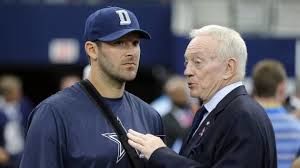
In therapy, one of the most common sources of distress comes from decisions - making them, not regretting them, feeling decisive and committed afterwards etc.
Major life decisions or choice points are complicated, and laced with high stakes. And the mind naturally struggles to tolerate ambiguity and uncertainty so choice points can trigger ruminative waves of worry, doubt, and regret all too easily.
A general framework of thoroughness (e.g. Pro and Con lists) and efficiency (e.g. self-imposed deadlines) are needed to effectively manage this process.
To walk through an example NFL sports fans will know well, Jerry Jones (owner of the Dallas Cowboys) has a dilemma, at present. He must decide whether or not to keep the team’s previous franchise quarterback (Tony Romo).
To confront and think through a tough decision such as this is inherently anxiety-provoking. One principle I offer my clients at the start of this process is the pressure-relieving notion that, almost invariably, the different options inherent in choice points are approximately equal. Either option(s) would be understandable and reasonable, neither option(s) would be predictably worse than the other. All we can do is be careful and thoughtful with the information we have at our disposal at the time of the decision; we can control being cautious and well-informed even if we cannot control being “right” in retrospect.
This preface can help soothe and anchor the decision maker’s mind from jumping ahead with worry (“what if I make the wrong decision…what if…what if?”).
Another tip relates to simplifying the choice point ahead of time by mindfully teasing out embedded sub-decisions, and eliminating unnecessary options.
For instance, not only must Jerry Jones decide on whether to keep Romo or not, he must also decide whether Romo should be the presumed started or backup. This monkey wrench could be tabled (Jones could let Romo and Prescott’s spring training performances be the deciding factor) or extinguished (Romo is unaffordable as a backup so Jones only considers keeping Romo as a starter) ahead of time to ease the complexity of the decision.
Once the premise of the choice point has been fully clarified and polished in this manner, the next step consists of organizing and categorizing the most pertinent information, namely a list of likely benefits and consequences.
This is your classic Pros and Cons with a little twist - you have to apply this thought experiment to each option.
Meaning, Jerry Jones must make two lists (I present the abridged version for the purposes of brevity):
Keeping Tony Romo
Pros:
Romo offers a higher ceiling of talent and experience than Prescott (in theory and presuming full health) and, therefore, provides the team a greater chance for Super Bowl success.
Cons:
Keeping Romo (as a starter) creates a financial headache (he is expensive), a media headache (there will be an unending QB controversy in Dallas), and an anxiety headache (elevated injury risk).
Losing Romo
Pros:
Removal of financial, media, and anxiety headache.
Cons:
The loss of an opportunity to explore the potential of a Romo-led Cowboys team.
When constructing this list it is important to maintain a balanced and objective mindset with a keen eye toward relevant, rich, and helpful data.
For instance, Jerry Jones could analyze the difference in arm strength between the two quarterbacks but the value of that information would hardly be worth the investment in effort. Jones could solicit votes from every Cowboy player about whether they want Romo as the presumed starter but popularity is irrelevant to QB talent, so the additional information would only muddy the waters.
The final step in this process is to weigh the pros and cons appropriately (every pro and con is to some degree more or less valuable than all the other pros and cons).
A way to contextualize this series of mini-judgments is to explore and clarify personal values - our internal radar for the kind of person we want to be in life.
Jerry Jones will need to introspect to clarify whether he is the kind of owner that would rather give a hall of fame candidate in the final chapter of his career another chance to win a super bowl, or allow the franchise’s future in Prescott to maximize growth and remain at the helm in Year 2 of his career.
To further clarify values, Jones could compare across pro/con lists and envision his emotional reaction to worst case scenarios by asking himself:
Which is worse, the risk of sticking with Romo and losing him to an injury or prematurely committing to Prescott who turns out to be a worse quarterback?
Which is better, winning with Romo or winning with Prescott?
Hard questions to answer. Good luck, Jerry Jones.




